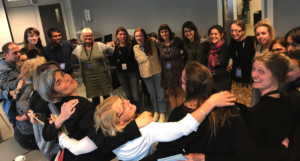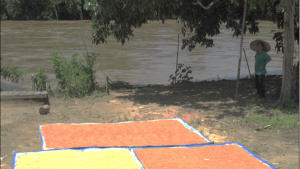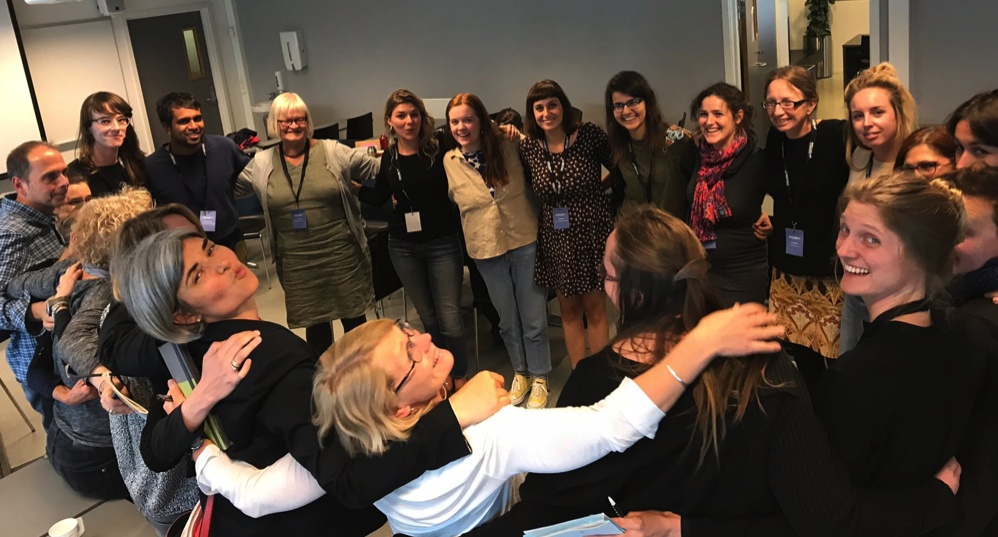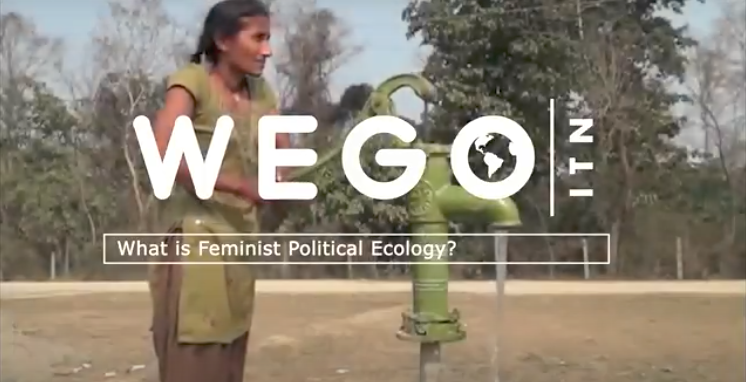
At POLLEN it was great to meet up with members of the WEGO-ITN team including Becky, Andrea and Lyla and PhD Ilena who will be joining us in September (at Humboldt). There were other feminist political ecologists there who we met in corridors and in sessions which made it a very good platform for issues of gender and race to come to the fore, especially in dialogue with some of the white male political ecologists who rarely consider gender and race. We had one full day devoted to FPE ‘Nurturing “Life-in-Common”: Affective, Emotional and Embodied Practices of/for Abundance Beyond Sustainability’ among a sea of other workshops and sessions that was a wonderful breathing space.
Another highlight for me was meeting with the ITN Entitle people and discussing how we can link our website to their Blog
Summary of presentations
I made three presentations – see the summaries of what I said and – do note the post scripts!
Nurturing “Life-in-Common”: Affective, Emotional and Embodied Practices of/for Abundance Beyond Sustainability II,
Panels organised by Pamela Ngwenya (German Institute for Tropical and Subtropical Agriculture), Andrea Nightingale (Swedish University of Agricultural Sciences), Neera Singh, (University of Toronto).
My paper at the second session of this day-long FPE feast was entitled ‘Differential Belongs: Caring for Country and Earthothers’ responded to the call by Arturo Escobar to ‘reappropriate, reconstruct and reinvent our personal and political lifeworlds’ in an exploration of the possibilities for more ethical economic and ecological relationships around care, taking my cue from the work of JK Gibson Graham on feminist imaginaries. The paper presented post-development and post-capitalist readings of the economy and environment as part of an on-going quest to include ‘earthothers’ in ecological theory and practice of care. I looked at how natureculture that shapes her historical life-world as a white Australian and queries traditional white settler narratives of conquest and erasure. My somewhat quirky entry point was white settler care for the Begonia flower in Western Victoria alongside the violence and erasure of the Wathaurong peoples who lived and care for Country. My interest was into how to transform and build on conflicting stories of transpecies care in the face of deep cultural erasures, racial violence, environmental destruction and urban development. The story is linked to the perseverance of communities, commons, and the struggles for their defense and reconstitution and the struggle to maintain multiple worlds –the pluriverse—a world where many worlds fit. The paper used epistemologies of listening and decolonising methodologies in order to expose the uneven flows of power and privilege and to reach across colonial violence and racism to transracial and interspecies interactions linking communities and commons.
PS:The paper is about my struggles to come to terms with transspecies care in the midst of white settler violence from my position of whiteness and struggle for justice. It was wonderful that one young woman came up to me and gave me this song to listen too as she felt that spoke to my paper. My honesty and engagement with difficult issues was risky but important for me to speak to in that safe space. Listen to the song – it continues to enchant me.
Roundtable on ‘Alternatives to Development: Towards the Pluriverse’
organised by Ashish Kothari, Scholar Activist (India)
At the Roundtable, I presented how Body Politics has been an important political project among feminist and queer activists transnationally since the 1980s. Within body politics, bodies are considered sites of cultural and political resistance to the dominant understanding of the ‘normal’ body as white, male, western and heterosexual from which all ‘other’ forms of bodies differ. Body politics, then, ranges from liberal economic justice demands for fairer treatment of marginal workers such as sex workers to more radical social justice demands for the integrity and right for all peoples’ sexual orientation. For example, body politics was a disruptive and critical force in queer and feminist interventions in the 1990s United Nations global conferences on human rights (1993) population (1994) and women (1995). Activists working in these different UN conferences brought to international attention issues such as domestic violence, rape as a weapon of war, sexual and reproductive rights of women, and the rights of indigenous, homosexuals and transgender people. Their campaigns spoke out not only against gender inequalities but also against racism, ageism and heterosexual norms. In this way, body politics has linked different forms of bodily oppression with radical forms of democracy. I argued that body politics is not only about struggles to end oppression but also about ways to reimagine and remake the world. This includes understandings of sexuality, diversity and well-being from the perspective of the marginalised ‘other.’
PS: Speaking with Ashish Kothari, Joan Martin Alier and other degrowth people was good for our WEGO positioning and future work! After I spoke about body politics a young woman came up and told me about the Vigeland sculpture park where the statues are that I used for the cover my body politics book – it was just up the road – she didn’t know I used them for the cover – but my talk spoke again to her about them – and I did go and see them.
Roundtable on ‘Speaking Power to ‘Post-Truth’: Critical Political Ecology and the New Authoritarianism’
organised by Ben Neimark and John Childs (Lancaster University)
As one of the authors of a recent article on ‘Speaking Power to ‘Post-Truth’: Critical Political Ecology and the New Authoritarianism’I spoke to the problems of challenging hegemonic ‘scientific’ narratives about environmental problems and how to critically engage with narratives of environmental change while simultaneously confronting the ‘populist’ promotion of ‘alternative facts’? From a feminist political ecology perspective I argued for a strategy of ‘speaking power to post-truth’, which would enable two things. First, it allows political ecology to come to terms with an ‘internal’ paradox of how to deal with those seeking to obfuscate or deny environmental degradation and social injustice, in relation to its own historical critique of the privileged role of Western science and expert knowledge in determining dominant forms of environmental governance. I asked how to enable political ecology to not only confront contemporary authoritarianism but to make political ecology more relevant, accessible and engaging to the marginalized populations most likely to suffer from the proliferation of post-truth politics, most notably around the denial of climate change and its impacts.
PS: This was more of a soap box affair as we each had two minutes to speak – but very engaging with many people attending and a lot of interesting dialogue, I learnt a lot from my group who were young people from Turkey, Australia, US, India and UK.
Rebecca Elmhurst presented two papers at POLLEN.
Rebecca Elmhirst (in panel on Political ecologies of Forestry and Injustice, chaired by Professor Paul Robbins) Social Justice in the Zero Deforestation Movement in Indonesia: the Gendered Limits of a ‘Green’ Oil Palm Economy.

This paper presented an analysis of the gendered impacts of oil palm investment in Indonesia as a ‘green growth strategy’, seen through the lens of feminist political ecology. It offered a reflection of the knowledge politics inherent in engaging simultaneously with the embodied and highly exclusionary experiences of people and communities in oil palm contexts, and with policy discourses with a seemingly progressive agenda of rescaling oil palm investment to the smallholder rather than the large scale corporation. Detailed empirical work has provided a set of evidence-based conclusions about socially differentiated and unjust experiences around land acquisition and incorporation into oil palm value chains that connect with the policy narratives of international environment and social justice NGOs. However, the paper also offered some more radical conclusions developed from taking a critical feminist political ecology approach. The paper argued that there is some danger that when a complex and intersectional analysis is brought into conversation with policy agendas, it is easy to slide into narratives that legitimate green neoliberal development agendas, in part because liberal feminist ‘women in development’ ideas run deep in gender mainstreaming work. It also suggested that a focus on gendered resource access issues in the context of the ‘virtuous smallholder’ policy narrative invites neoliberal solutions that rescale ecological responsibility around oil palm development to the smallholder, male or female. A related point is whether it is possible to address oil palm-led development hegemony where it is difficult for people to imagine alternatives. In such a context, the showcasing of ‘successful’ smallholder oil palm investors blunts critique as dissenters lose the right to be an obstacle to oil palm-led ‘development progress’.
Rebecca also presented a paper written collaboratively with Carl Middleton from Chulalongkorn University, Bangkok, which was on their work on “Living with Floods in a Mobile Southeast Asia” in the panel on political ecology, water, and the hydrosocial cycle. This paper sets out a ‘mobile political ecology’ framework to look at how migration and everyday mobilities form part of the social-ecological production of vulnerability and capability in the context of flooding. It draws lessons from comparisons between eight empirical case studies undertaken in Thailand, Cambodia, Lao PDR, Vietnam, Myanmar, Indonesia, Malaysia and the Philippines. Each country case study applied a “progressive contextualization” methodology that disentangles and traces the specific conjuncture of particular flood types (as a specific techno-socio-natural assemblage), and the dynamic interplay between migration and gendered socio-spatial justice and entitlements to material and political resources. Whilst a political ecology approach challenges simplistic environmental ‘triggers’, a focus on mobility challenges sedentarist and state-centric ontologies of flood hazards, which make no sense in a region that owes its history to mobilities of people, capital and nature.
Lyla Mehta presented two papers and also spoke at a roundtable/panel on publishing in political ecology and presented the new journal she is currently editing in Environment and Planning E, Nature and Space.
The Social Life of Mangroves:Enactment of Conservation in the Marketised Landscape of Kutch, India
Authors: Shilpi Srivastava and Lyla Mehta
This paper unpacks the assemblages and relationships that accrue through the state and market led conservation programmes in Kutch, a district which has been at the forefront of accelerated industrialisation in Gujarat, India. In this paper, we argue that the interaction of industrialisation processes with conservation measures have encouraged both blue and green grabbing as afforestation and restoration practices have given way to new forms of accumulation. These processes have fundamentally altered the livelihoods of mangrove dependent communities such as fishers and pastoralists as mangrove lands now service the engines of capitalist accumulation. Largely these trends have intensified the processes of uneven capitalist growth, dispossession and inequality, whilst giving rise to new kinds of alliances between the state and corporate capital as well as capital and the scientific community that replay narratives of ecological harm, degradation and loss, and promote corporate governance of the mangrove lands.
Shilpi Srivastavais a Research Fellow at IDS. Trained as a political sociologist, she uses the lens of water to understand issues of power and patterns of authority to explore spaces of justice, rights and accountability. Besides researching on water policy, climate change and environmental processes, she is also increasingly interested in cross cutting research in the areas of health, sanitation and nutrition. She has extensive field research experience in Asia.
Contact information: s.srivastava2@ids.ac.uk
Lyla Mehtais a Professorial Fellow at IDS and a Visiting Professor at the Norwegian University of Life Sciences. Her work focuses on water and sanitation, forced displacement and resistance, scarcity, rights and access, resource grabbing and the politics of environment/ development and sustainability. She has extensive field research experience in South Asia and Africa.



